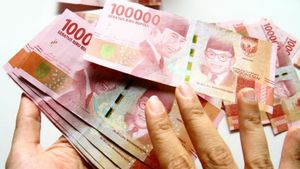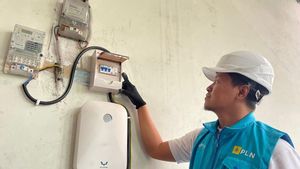JAKARTA - The government continues to strive to restore the economy after the COVID-19 pandemic.
Based on data from the Central Statistics Agency (BPS), Indonesia experienced a contraction in economic growth in 2020 of 2.07 percent, from previous years in the range of 5 percent.
Then, the economy gradually recovered with a GDP rate of 3.7 percent in 2021 and 5.31 percent in 2022.
However, the world's economic recovery is slower than expected in line with a number of external sentiment that suppresses the economy, from geopolitical problems, high interest rate trends to food and energy crises.
This condition has a negative impact on the business world as seen from the number of bankruptcy cases and PKPU. Based on a search from the Case Tracing Information System (SIPP) from five commercial courts in Indonesia, the COVID-19 pandemic has triggered an increasing trend of applications for bankruptcy and Postponement of Debt Payment Obligations (PKPU).
For information, the number of bankruptcy applications and PKPU in 2019 was recorded at only 435 submissions.
However, the number of applications increased dramatically to 635 applications in 2020, and reached its peak in 2021 with 726 applications.
Then in 2022, application submissions began to fall to 625, and until October 14, 2023 to 563 applications.
Looking at this data, the submission of bankruptcy applications and PKPU throughout October 2023 is still higher than the application in 2019, of course the economy cannot be said to have fully recovered.
At the same time, there are more and more external pressures and sentiments that are feared to limit the national economic recovery.
On the other hand, the government will rely on and seek conditions and conditions that are conducive in the country with a number of incentives to drive the domestic economy as well as legal guarantees and business certainty for the private sector.
As for legal guarantees and certainty, trying is one of the obstacles for ease of doing business in Indonesia, where based on the Ease of Doing Business (EoDB) Index issued by the World Bank, Indonesia's ranking in the world is in position 73 from 2018 to 2020.
Meanwhile in Asean, Indonesia's EoDB index in 2020 was recorded at only 69.6, below Vietnam 69.8; Brunei 70.1; Thailand 80.1; Malaysia 81.5 and Singapore 86.2.
The ranking of ease of trying is a guide and benchmark for every investor who wants to invest in a jurisdiction.
EoDB is considered to represent an assessment of the ability of state entities to ensure easy access to markets, protection of property rights, and certainty of business sector regulations.
In addition, the government has set three indicator points in the priority program for improving the criminal and civil law system which is contained in the 2020-2024 National Medium-Term Development Plan (RPJMN).
The three indicators include Indonesia's EoDB ranking for contract enforcement aspects, Indonesia's EoDB ranking for the aspect of bankruptcy settlement, and Indonesia's EoDB rating for credit aspects.
As one of the efforts to realize the improvement of the legal system, the government has also submitted a Bill on Amendments to Law no. 37/2004 concerning Bankruptcy and PKPU, in the National Legislation Program (Prolegnas) for the 2020-2024 period. However, until now the amendment bill has not yet been discussed.
Economic Aspects
Senior Partner and Head of the Dispute Resolution and Restructuring & Insolvency Practice Groups Hadiputranto, Hadinoto & Partners Andi Y Kadir revealed, the bankruptcy process and PKPU are not only legal aspects but also related to the economic aspect.
"In the debt restructuring process, we are not only discussing the infrastructure [Law No. 37/2004] is sufficient or not, but also about the recovery rate for creditors and companies [debtors] who have gone through the PKPU process have become a healthy company or even become a zombie company," he explained, Friday, October 20.
Andi said the lack of consistency in the application of Law no. 37/2004 resulted in a protracted debt restructuring process, a low recovery rate to an imbalance in position between creditors and debtors, making the cost of financing in Indonesia higher than other countries.
In fact, he said, the spirit and noble ideals of the Bankruptcy Law and PKPU, namely restructuring and peace through a special court that ensures dispute resolution is fair, fast, open, and effective in order to create certainty for the business world.
"This higher cost financing in the end actually disrupts economic recovery," he said.
He gave an example of a debate over whether a debt can be proven simply, where this issue is one of the most debated points in submitting applications for bankruptcy or PKPU.
Furthermore, said Andi, Law no. 37/2004 actually has stipulated that the arbitration clause mentioned in the agreement does not eliminate the authority of the commercial court to examine it.
However, according to Andi, what happened was that the arbitration clause was used to declare the commercial court not authorized.
"What is happening now is actually a setback because actually the article is regulated so as not to trigger a debate." he explained
Andi added, regarding credit agreements that are subject to foreign law, whether or not they can apply for bankruptcy or PKPU in Indonesia.
"This is often inconsistent. Whereas commercial courts should accept because commercial courts cannot check, it will make all credit agreement cases subject to foreign law the settlement is brought outside. That's actually not good for the development of Indonesian law," he explained.
Andi said there was a tendency that the law, which was enthusiastic and the goal was restructuring and peace, is now often used as a tool to collect debts or contrary to restructuring. Things that often happen to the private sector and state-owned enterprises (BUMN).
The founder of the Indonesian Center for Law & Policy Studies (PSHK), who is also a lecturer at the UI Faculty of Law and Member of the Supreme Court's Judicial Update Team, Aria Suyudi revealed that since the enactment of Law no. 37/2004, PKPU is often the easiest means to collect debts, instead of making peace or restructuring.
Aria revealed that there was a tendency for bankruptcy procedures and PKPUs to be exploited as a dispute strategy, even though they did not meet the category of requirements for bankruptcy statements.
"It makes bankruptcy and PKPU not run according to their proper function." he explained
Born From Crisis
The Bankruptcy Law and PKPU cannot be separated from the economic conditions of a country.
The Bankruptcy Law in Indonesia itself was born due to the monetary crisis in 1997-1998.
The issue of resolving the company's debt during the monetary turmoil at that time became an urgent issue that must be resolved immediately
Debtors and creditors need certainty of dispute resolutions fairly, quickly, openly, and effectively through a special court to handle, examine, and decide various disputes in the field of bankruptcy and PKPU.
SEE ALSO:
For this reason, Perppu No. 1/1998 concerning Amendments to the Bankruptcy Law on April 22, 1998, which was later passed into Law No. 4/1998 concerning the Bankruptcy Law (UUK) on September 9, 1998.
Six years later, due to a number of weaknesses, Law no. 4/1998 was revoked and revised to Law no. 37/2004 which is valid until now.
Almost two decades of age or 19 years to be precise, Law no. 37/2004 certainly requires a number of adjustments and reinforcement based on the current conditions and situations in line with the dynamically moving economy.
The English, Chinese, Japanese, Arabic, and French versions are automatically generated by the AI. So there may still be inaccuracies in translating, please always see Indonesian as our main language. (system supported by DigitalSiber.id)

















